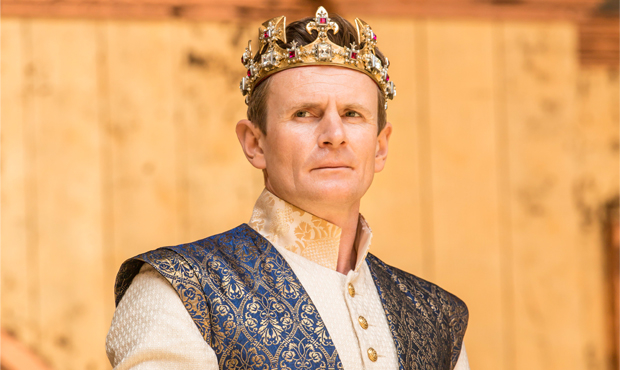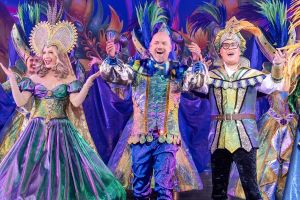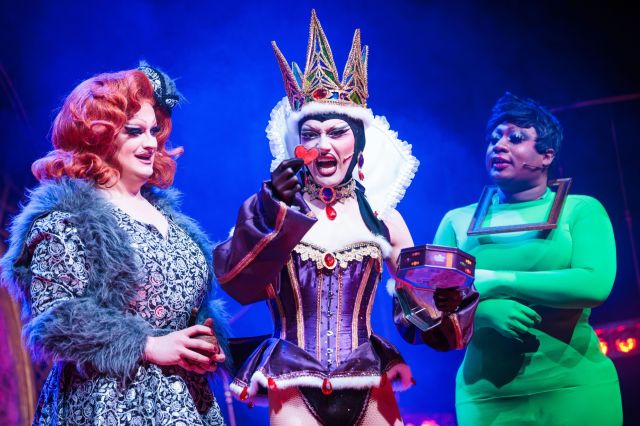
© Charles Edwards as Richard II
There is an interpolated prologue to Simon Godwin's highly intelligent and fast-moving production at the Globe: a boy king – looking remarkably like Mark Lester in Oliver! – is presented on a golden throne and the arena fills with gold dust. When the dust settles, Charles Edwards is in situ and we're off, "Old John of Gaunt, time-honoured Lancaster…"
The idea of succession is established and the following events – the dispute between Henry Herford (later Bolingbroke) and Thomas Mowbray, their banishment, the expedition to Ireland, rebellion and abdication – all suggest a land in turmoil, a churning over and replanting as symbolised in the marvellous garden scene.
We've had some terrific Richards of Bordeaux lately – not least Mark Rylance himself and (returning to the Barbican in the New Year) David Tennant with the RSC. But Edwards, a really fine actor, now proves himself a great one: his Richard describes, more acidly and more exactly than any Richard since the great Ian Richardson/Richard Pascoe alternating pairing of the king and Bolingbroke, his journey into self-knowledge without self-pity or weepiness.
Nor does he play the mad hermit in Pomfret prison where his diet is thin gruel and rough brutality. Nor do Godwin and Edwards stint on the decadence of the king's courtiers, though their whimsical feyness is the expression of a charmed circle, not a musical comedy. There's one great flash of costumed extravagance, then Richard idly checks the material samples offered by an attendant before swishing off to see the dying Gaunt: "Pray God we may make haste and come too late!"
Edwards's Benedict may have been seriously outgunned on this stage by Eve Best's Beatrice, but he rules the roost with an iron clasp on lines like that. His sense of the divine right of kings becomes a hubristic sense of entitlement, the source of his tragedy. When he returns from Ireland in a glittering canopy he is dazzled by his own radiance, but the minute Bolingbroke (a great performance, too, by David Sturzaker – I almost wrote "Stargazer") has the political momentum behind him, he entreats his friends to sit upon the ground – waiting, in steely silence, for them to do so – and tell sad stories of the death of kings.
Edwards has the trick of being self-dramatising without being tedious down to a fine art. And the journey is almost complete when he descends, "like glittering phaeton" at Flint castle. That's ninety minutes, and the interval, and we're half-way through the third act. Amazing.
After the garden scene ("Go bind thou up yon dangling apricocks" for once gets the laugh it deserves), and while Richard languishes ("I wasted time and now doth time waste me"), the Aumerle conspiracy, which can drag, is injected with high farcical spirits, the Yorks (Williams Chubb and Sarah Woodward) fighting over the duke's boots, hurling them into the audience, as they rush to plead their son's (Graham Butler) cause on their knees, like comedy midgets.
Paul Wills's design of a gilded cruciform platform, with the notorious pillars gilded, too, and an upstage wall of apertures and doorways, the gallery on top, is ideal for the play, and looks good, too. Marvellous music for trombones and sackbuts by Stephen Warbeck invades the whole space.
Pace and clarity are perfectly maintained from start to finish, and the philosophical centre of the play remains old Gaunt's lament for this sceptred isle and his contempt for a monarch who's become a corrupt landlord. The role is taken magnificently by the indomitable William Gaunt – Gaunt as Gaunt, a character fully aware of his own gauntness – a stroke of casting that is as witty as it is completely appropriate.
Richard II runs at Shakespeare's Globe until 18 October. For more information or to book tickets, click here












